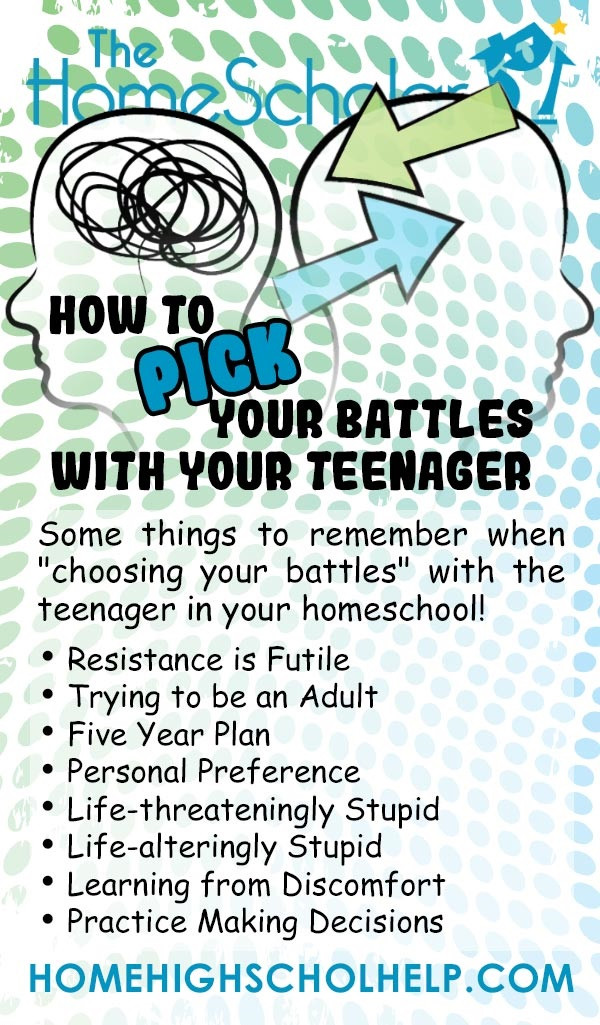How to Pick Your Battles With Your Teenager
Teenagers. The very word can make adults shudder! Often the mere mention of the word is accompanied by a head shake or a groan. But it doesn't have to be that way. Pick your battles and have a little understanding with your teenager and you can go a long way in your homeschool!
Resistance can look like many things in teenagers - from refusing to put on a coat when asked, to bringing home a big can of worms, their resistance to our common sense can be so frustrating! When our children are young, sometimes parents work hard to train children that resistance is futile - just obey mom and dad! But when teenagers get older, we realize that OUR resistance is futile. They simply won't do what we ask - it's like leading a horse to water, you can't make them drink! Pick your battles carefully.
Sometimes, even with our best efforts and a wholesome homelife, kids can make crummy decisions. It might be gambling, drinking, drugs, living together, or losing the faith. It's devastating. Others may be tempted to blame the family life for this failure, or try to find the missing curriculum ingredient, as if this were an academic gap, when it's not.
When your teens are growing up, remember they are also growing into adulthood. They are trying hard to become an adult, and make adult decisions. Decision making doesn't happen overnight. They need practice. They are wanting to become independent, and we want to encourage them to grow up. While we are responsible to teach them and raise them right, THEY are responsible for what they do with that information. It's like a test - you can teach them, but you can't make them score well. You can lead a horse to water, but you can't really do much beyond that.
Almost every parent with children over 18 or 20 knows what it's like to watch a child make a horrible life choice. Younger moms may not understand, but older moms do. Adult decisions in the real world are tough. The Bible verse says "train up a child... and when he is old." There is no definition of what "old" means in that verse. It could be 24 (the most common age for kids to get a clue) or it could be 84, we just don't know. You are responsible for your own behavior as an adult, not the behavior of another adult - like your child going their own way.
If you find yourself in this complicated, devastating situation, here are some books I recommend:
- Setting Boundaries with Your Adult Children by Allison Bottke
- The Power of Praying for Your Adult Chidren by Stormie Omartian
During high school is a time in life when you have to think about the 5 year plan. When giving advice or direction, consider whether it will really matter in 5 years. You can always give advice, but don't get too emotionally invested in children taking your advice unless it will matter in five years. Most of our suggestions really won't matter in 5 years at all.
Independent adults are all unique individuals with personal preferences, and your child is becoming an adult with their own unique interests, habits, and desires. As they get older, try not to step in if they are doing something that is just personal preference. Consider the habit of wearing a coat, or eating a meal. These are things that you might see in another adult and think "I wouldn't do it that way, but whatever!" That's how you know it's a personal preference - if you wouldn't confront a neighbor about it, you may not need to confront your child about it either.
On the other hand, do try to step in when it's life-threatening in some way, or "life-threateningly stupid" as my husband and I would say. For example, when a blizzard is expected in Montana, it might be life-threateningly stupid to leave home without a coat, but usually it's one of those things that won't matter in 5 years. Most teenagers, especially older teens, are trying to make their own decisions. They need to face the consequences of their own decisions so they can learn. If a decision isn't going to hurt and won't matter in 5 years, and another adult might make that same decision without you intervening, then perhaps they need to learn something by making the decision to not wear a coat in a blizzard.
There are other decisions that may not cost their lives, but they can certainly ruin their lives. In our society premarital sex, alcohol abuse, and drug use are common examples. Some decisions are permanent and can't be taken back. Decisions about tattoos, for example, are life-altering (although everyone has differing opinions about tattoos) and it might be best to delay those decisions until adulthood, just to be sure.
When they make choices you wish they wouldn't make, it may cause some discomfort. I remember when Kevin wanted to take engineering classes AND honors level courses in college. Ouch! That sounded painful! But when a decision will cause discomfort, your child may ultimately learn to avoid that sort of discomfort when possible - and ultimately not volunteer to do something that isn't necessary or important. When our children were two years old, I focused on "natural consequences" so they could see the results of disobedience. With teenagers, continue to focus again on those natural consequences so they can learn. Remember, it's important to pick your battles carefully.
Right now, while they are living at home, is the best time to allow decision-making practice. You can help them consider their options (it may sound like advice to them, I suppose) and support them in their decision, even if you wouldn't make the same decision yourself. You can help them learn from their choices - pointing out both the good and bad things they learned. Allow perfectly fine decisions, personal preferences, and a decision that another adult might choose to make even if you and I wouldn't make that decision.
If you have a child that is consistently making poor choices, it might be beneficial for you to seek out a friend. If you don't have anyone that you can confide in for help, please consider joining my Gold Care Club. I have helped many families work through the choices that their children are making. It can be a painful process and sometimes all you (as the parent) needs is to have a friend to provide you with an outside look.
What does it look like to pick your battles with your teenagers? Which things do you let go?

 Login
Login









.jpg)

Comments